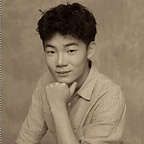The Rose-Puckers | tour de force
a wine-tainted rosebud, almost black in the little light there was.
Nature has no reason to harmonise with human ambitions. Indeed, to Arlette it seemed as if Nature had taken all its strength to vex and repel her unwanted, probing fingers. The bushes were especially dense in the early-morning, with the mist of the sun casting the leaves into a dull greenish-blue: the kind one could sometimes catch on the flank of fresh fish in the marketplace. A welcoming colour to the amateur eye, it was pleasing, mild and sweet. But she knew it was all a lie; a trick by the rosebushes so that the inquisitive hand cannot distinguish between leaf and thorn.
The glint of the dull secateurs almost radiated silver in-between the sea of dark-olive. From behind, a wind swept up from the houses and onto the sides of the hills. The parted leaves rustled against her bare arms as she held them back. Arlette leaned closer.
A wine-tainted rosebud, almost black in the little light there was. Adorned with a gown of sepals that wrapt snug to her frame, the rose parted her tight-bound petals just a little. A shy, embarrassed little think it was: isolated, beautiful, vulnerable. She reached forward with little thought. One leaf below the stem. A clean cut at a slant angle was all she needed: one snip that left nothing but a glistening wound which should heal within a few church-bells.
Arlette leaned forward, a few locks of unbound hair drifting between her eyes, this direction and that. Her arms grew numb: her strength was failing her. The wind was agitated: into her chest it blew, hard and unrelenting. ‘Cool your heart’ it seemed to say, ‘let down your hand and consider carefully what horrible deed you are about to commit’. She leaned back, shook her head and drew another breath. She let go.
A crash as the parted branches embraced in greeting. Once again, the bud was under protection from the leaves and the thorns. The stained-crimson grew just a little deeper as the leaves filtered away the light of the sunrise. From the depths of that rustling ocean, it appeared to be sinking, sinking.
The wind pulled back her hair. All around her, her companions went on with their duties: hunched over and intense. Their baskets full of deep red and deep indigo and deep green. She felt a heat rise from her chest into her face. She felt inadequate — she was inadequate. Beaten by a flower yet-to-bloom. By a plant. By herself.
Taking a draft, she plunged her hands into the bush: the edges of the of the leaves drew cuts along her tender inner-arms, but she fumbled in their masses: relentless, agitated. Arlette, Arlette. Her fingers ran along each stem, cold and stiff from the morning dew. Tracing about in a haste: she felt nothing but hard, lifeless thorns. Down in these depths, these thorns never saw the sun or the moon or felt the drew run along their sharp bodies. These were dead and dry and brittle: the same way bones were dead and dry and brittle, laid bare in a dug-up grave.
But then there was a lightness which softened her fingers. Gently brushing away the sepals, she felt the velvet-and-chiffon petals nudging against her. This was it. Now, it was one leaf below the stem, snipping off at a slant…
But in her passionate storm she had lost her secateurs. They lay by her feet on the mud-trodden lane, wet and cold. Useless. No, she must snap it off.
But the thorns: she felt them too. They dug into her arms and her wrists and the back of her hands: pinning, chaining, restraining and pleading. Arlette held the bud by the throat, and the thorns held her arms in place. It was one or the other.
One leaf below the stem at a slanted angle…She closed her eyes.
The sound of the snapping was a dull crunch which only she heard. Her arms trembled and her heart pulsed in her ear. At this sound, the thorns seemed to finally relent. And as she pulled out her marred arms they hid behind the leaves in shame: subjects mourning the loss of their queen. The wind was utterly dumbstruck by such an act of barbarism: it whistled in disapprovement and dispersed away in a sigh. All was silent now. All was still.
She threw the bud into the basket. She inspected her arms: small gnashes where the valiant prickles had left their sword-jabs. Some were bleeding, a delicate line of red lace across a bleached canvas. The blood shone a deep crimson in the early sunrise, almost like a wine-stain. They ached, but she unrolled her sleeves and held the coarse linen against the marks. Arlette grimaced a little, her inky brows furrowed as she dabbed both her arms dry.
There was nothing beautiful about them, those roses. She ginglerly snatched the bud from her basket again, lifted it up to her eyes. It was a rushed, destructive snap. The bud was ripped off its stem with the leftover mush of flesh still oozing, bleeding. From the looks of it, her fingers would leave scars on the bush. She brought it to her nose: a faint, dreamy scent with the salty, iron taste of blood. No wonder they were sold for fortune to the perfumers: red against red only made red seem redder. She crouched to pick up her secateurs.
As Arlette rose again, the full fledged sun cast a golden haze over the hills of Grasse.
